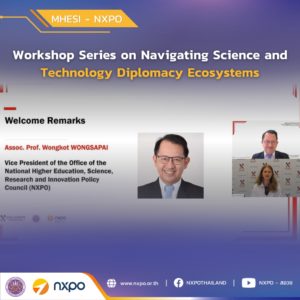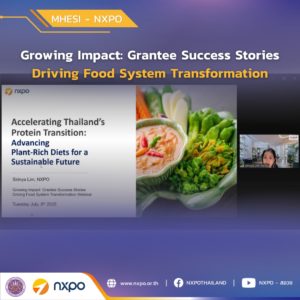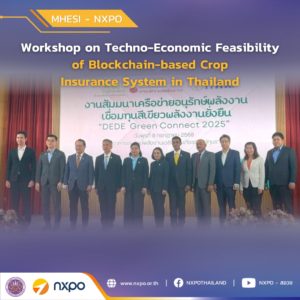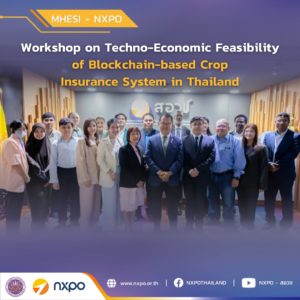NXPO convened its Executive Board meeting on 22 March 2024, with Ms. Supamas Isarabhakdi, Minister of Higher Education, Science, Research and Innovation (MHESI) serving as the chairperson. During the session, the progress of two initiatives – the Higher Education Sandbox and the Thailand Academy for Area Collaboration, Innovation and Transformation (TACIT) – was reported.

Minister Supamas highlighted that the Higher Education Sandbox stands as MHESI’s top policy, aimed at removing regulatory restrictions to empower universities in cultivating skilled workforces in critical fields through engagement with the industry.

In his presentation, NXPO President Dr. Kitipong Promwong outlined the manpower development framework, supporting measures, and incentives. The STEMPlus Platform has been established to address the growing demand for highly skilled workforces in future industries by fostering collaboration among stakeholders. The platform also supports incentive programs under the Thailand Plus Package, offering 150% corporate tax deductions for STEM employment and 250% deductions for employee training expenses. Since its inception, the platform has certified 5,724 STEM employments from 112 companies. A total of 828 training courses from 95 training centers have been certified, contributing to the upskilling of 81,599 individuals.

The Thailand Talent Landscape reveals survey results on the demand for high-skilled talent across 12 target industries between 2020 to 2024. The study unveils striking data on workforce needs in target industries as follows: 30,743 positions in the digital industry, 29,289 in aviation and transportation, 17,732 in medical and healthcare, 15,432 in high-income and wellness tourism, 14,907 in advanced agriculture and biotechnology, 12,458 in future food, 12,254 in human resource development and education, 12,231 in future automotive, 10,020 in industrial robotics, and 9,836 in bioenergy and biochemicals.

The GenNX Model, a skill development program, has introduced two training courses tailored for junior software developers and senior care professionals. Over 85% of participants were able to secure employment upon completing the GenNX courses. Furthermore, NXPO is collaborating with nine universities under the Rajamangala University of Technology system to design the Job Guarantee Thailand program, aimed at addressing the country’s urgent workforce needs.
“A total of 11 courses have been approved to operate under the Higher Education Sandbox, expected to produce 19,695 highly skilled graduates within the next decade. Among these, seven programs were launched in the 2023 academic year, enrolling 530 students in total. An MOU signing and Campus Tour event was recently organized to launch the “Semiconductor and Advanced Electronics” workforce development project, a joint initiative between the Office of the Permanent Secretary of MHESI and the industry,” Dr. Kitipong reported.
The board unanimously agreed that the sandbox scheme is an effective program to ensure that Thailand has skilled workforces to support advanced industries, emphasizing the need to be promoted among foreign investors to attract inbound investment. Moreover, the program should be expanded and linked to the skilled workforce demand survey to facilitate the development of new courses to meet future manpower demands.

Meanwhile, Dr. Kitti Satjawattana, Director of Program Management Unit on Area Based Development (PMU A), provided updates on the establishment of TACIT. Serveing as a knowledge management center, TACIT is designed to form a network with 23 universities under the Rajabhat University system to leverage knowledge and innovation for cultural management and area-based development. Cultural products and heritage derived from research and development will be showcased to Thai people and foreigners to drive the community economy, and inform policymakers in designing effective policies to alleviate poverty and increase access to education and technology for career advancement.







